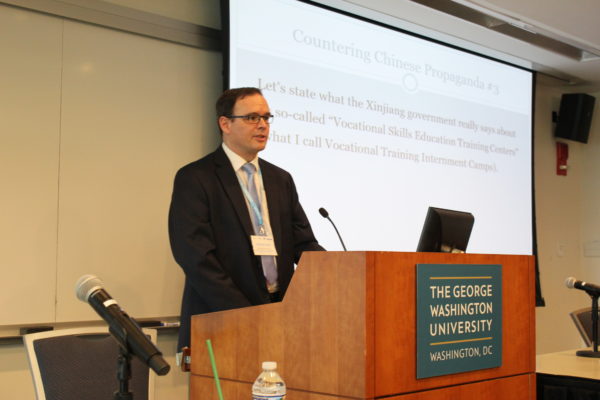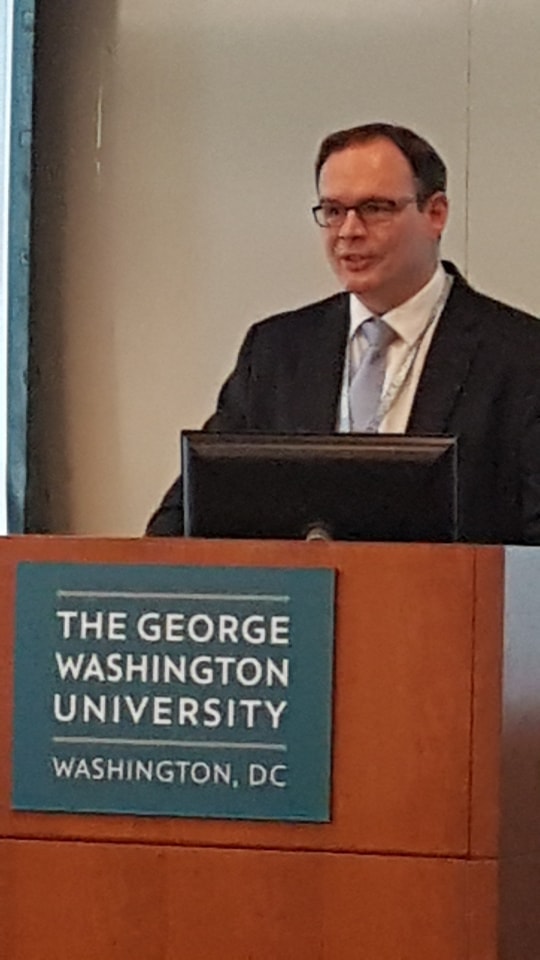The Ideological Rape of the Xinjiang Youth. For Scholar Adrian Zenz, It Is Cultural Genocide

Bitter Winter, 9 July 2019
 By Marco Respinti – According to some evaluations, the transformation through education camps throughout Xinjiang ‒ the region that Uyghurs prefer to call East Turkestan ‒ detain 3 million Muslim Turkic people. Unlawfully, since none of them passed through any trial, their crime being their ethnicity and religious faith.
By Marco Respinti – According to some evaluations, the transformation through education camps throughout Xinjiang ‒ the region that Uyghurs prefer to call East Turkestan ‒ detain 3 million Muslim Turkic people. Unlawfully, since none of them passed through any trial, their crime being their ethnicity and religious faith.
The most scrupulous expert on this topic is German scholar Adrian Zenz, an independent researcher and Ph.D. supervisor at the European School of Culture and Theology, Korntal, Germany. He specializes in China’s ethnic minority policy, minority education systems, public recruitment (especially teacher and police/security-related recruitment), public bid documentation, domestic security budgets, and securitization practices in China’s Tibetan region and Xinjiang. He has authored “Tibetanness” under Threat?: Neo-Integrationism, Minority Education and Career Strategies in Qinghai, P.R. China (Leiden [The Netherlands] and Boston: Global Oriental, 2013) and co-edited Mapping Amdo: Dynamics of Change (Prague: Oriental Institute, 2017).
When he first published his research on the population of the Xinjiang camps one year ago, the number of detainees “deprogrammed” by the Chinese regime was 1 million. So, according to sources, the figure has tripled in more or less 12 months. In the meantime, Beijing pretends that these detention camps are “vocational training centers,” established to combat violent religious extremism. However, Bitter Winterhas been able to show the reality, publishing the first and only video from inside one of those dreadful camps, and Dr. Zenz himself has recently exposed the real tragical nature of those facilities.
There is another tragedy within this tragedy, and its name and narrative is the disrupted families. Muslim and Turkic people in Xinjiang are in fact arrested and interned by entire family groups. Parents are arrested, and so are grandparents, uncles, aunts, and cousins. Thus, only underaged kids remain outside the camps. This attracts the attention of the CCP – eager and avid to put its claws on the rising generation to educate it to ideological loyalty by disavowing their cultural and religious identity. Bitter Winter has also documented the staggering “re-education” centers for Uyghur children in another of its chilling video. No wonder, then, that Dr. Zenz’s new precious and profound research on the intentional disruption of families, perpetrated by the Chinese regime to obtain both the decimation of the region’s Turkic people and a free hand on the education of what will remain after its raids, is abundant with references to Bitter Winter.
Entitled Break Their Roots: Evidence for China’s Parent-Child Separation Campaign in Xinjiang and published in The Journal of Political Risk (Vol. 7, No. 7, July 2019), a peer-reviewed journal founded in May 2013 in New York, Dr. Zenz’s essay is chiefly based on available official documents, of which he is able to make full sense.
Children in “an extremely pitiful state”
Dr. Zenz observes that the situation for Uyghurs and other Muslim and Turkic minorities in Xinjiang has worsened since Spring 2017, when Mr. Chen Quanguo became the Secretary of the CCP for the Xinjiang Uyghur Autonomous Region (XUAR) ‒ and this is why the US plans for targeted sanctions under the so-called “Magnitsky Act” concentrate on him.

German scholar Dr. Andrian Zenz
However, the “[…] scale and exact nature of such intergenerational separation” that the Chinese government’s policy has brought and is bringing about, “[…] has been extremely difficult to ascertain,” due to “[…] a complete lack of official reporting and the state’s denial that this internment campaign is even taking place.” Moreover, as the German scholar underlines, some relatives think “[…] that these children are kept in orphanages” or are “[…] sheltered in regular public schools with boarding facilities.” His research couldn’t be more timely, as it systematically presents and analyzes “[…] all available evidence regarding state-initiated intergenerational separation in the context of Xinjiang’s political re-education and internment campaign.”
The German scholar’s report considers events which took place in the second half of 2018 and combine four different sources: “Firstly, existing witness accounts from former detainees and their relatives indicate quite consistently that children whose parents are in some form of internment are put into either orphanages or boarding schools, with the latter case being more prevalent. Secondly, government plans show that the state is requiring local authorities and schools to comprehensively deal with children whose parents are in some form of internment. Thirdly, official documents testify to an entire set of policies, most of them initiated within the first six months of Chen Quanguo’s deployment to Xinjiang, that are designed to systematically boost the ability of the state to house children of all ages in increasingly centralized and highly securitized educational boarding facilities. Fourthly, government reports and construction bids give evidence of the construction of such highly secured boarding facilities in the public education system and through special child protection centers.”
Despite the rhetoric of “special protection centers,” kids are treated miserably in many places. One witness, “[…] a Han Chinese volunteer teacher,” who “[…] posted on the Jiangxi Teacher’s College website,” says that “[…] children were in an extremely pitiful state, wearing thin clothes despite freezing December weather. The classroom was filled with an unbearable stench because the children neither washed nor changed their clothes.” Nonetheless, adding crime to the crime, the CCP regime holds that “[…] children of detained parents derive significant benefits from this separation.”
A systematic plan to kidnap and indoctrinate children
There is more than mistreatment, though. The picture that Dr. Zenz offers is that of an intentional ideological project aiming at controlling not only the present of Xinjiang, through the camps, but also its future, through the indoctrination of kids. Technology is also abundantly used to reach the goal. “In particular,” as he observes, “this state care is taking place in highly secured, centralized boarding facilities, independently of any guardianship that these children may or may not have. Driven by multi-billion dollar budgets, tight deadlines, and sophisticated digital database systems, this unprecedented campaign has enabled Xinjiang’s government to assimilate and indoctrinate children in closed environments by separating them from their parents.”
Religion ‒ Bitter Winter documents it daily ‒ is state’s public enemy no. 1, but we now realize, thanks to Dr. Zenz, that the family comes soon after, and above all, because family is the place where religious values and cultural identity are transmitted. Now, the separation of children from their parents, and relatives, “[…] can take various forms and degrees, including full daycare during work days, entire work weeks, and longer-term full-time separation. When taking into account the threat that Xinjiang’s education system makes children report on their parents, it is safe to assume that parental influence in general, and intergenerational cultural and religious transmission in particular, are being drastically reduced. In some instances, parental influence is quite possibly almost completely eliminated.” Does anyone need any other proof to call red China a totalitarian state?
One of the several concrete examples in Dr. Zenz’s report gives a full idea of what is really going on in XUAR. “By late February 2017,” he writes, “Xinjiang had begun the construction of 4,387 ‘bilingual’ (i.e. Chinese language focused) preschools, with a planned intake of 562,900 new students. The focus of this campaign was on the rural south, home to most of the Uyghur population, and it was done with great urgency. Several news reports state that the construction was done at maximum pace, using a Chinese idiom that refers to ‘spurring a horse to full speed’ with a whip (快马加鞭). The coordination between the involved government departments for the fast and efficient construction of the schools was said to be done in a ‘military command fashion’ (军令状). Preschool construction was supposed to be completed in time for the start of the new school year in September. However, Hotan Prefecture even required preschool construction to be finished before July 25. This massive and accelerated construction drive was financed through state bank loans totaling 8 billion RMB for the southern minority regions alone. Just in Kashgar Prefecture, central government subsidies for preschool construction amounted to 767.6 million RMB.” That is to say, almost US$1,2 billion (this is the equivalent of 8 billion renminbi) invested in the kidnapping and indoctrinating children to secure the continuity of the repressive state.
The “Xinjiang experiment” and the future of us all
What Dr. Zenz calls in his conclusion “[…] a coordinated state campaign to promote different forms of intergenerational separation” has already reached a frightening intermediate goal. In fact, “[b]y May 2019,” the German scholar explains, “the Xinjiang government is literally able to ‘parent’ at least tens of thousands, if not a hundred thousand or more children.” Even after the state releases parents, “[…] children can remain in full-time care or boarding facilities at least during the work week, meaning that the state gets more time to influence the next generation than the parents do. […] With the expansion of sophisticated care and boarding facilities, students can remain separated from parents for entire work weeks and possibly longer. This is almost certainly not coincidental, but a deliberate part of ‘breaking roots’ and changing Turkic minority societies through coercive social re-engineering.”
While his research has been widely reviewed by the Italian daily newspaper La Stampaand used by the BBC for an original report on the subject, Dr. Zenz has no doubt: this “[…] development of long-term social control mechanisms” is “[…] a clear indication that [the CCP’s] long-term goal in Xinjiang is a targeted cultural genocide, designed to completely alter and align the hearts and minds of the next generation with the Communist Party ideology.”
Here we go again – the awful, forbidden G word. Every time China is called accountable for what it is doing to its citizens, all ends in genocide, be it the dreadful practice of organ harvesting or the rape of youth in Xinjiang. How long will the rest of the world bear with this horrid situation, documented by scholars, academics, NGOs, and international organizations?
If the rest of the world continues to shy away and not look right in the eyes of the Chinese rulers, Beijing will transform the “Xinjiang experiment” into a national policy, maybe also export it along the new Silk Roads. XUAR is only the beginning, because “[…] China is using Xinjiang as a laboratory for advanced surveillance technologies and predictive policing methods. If the state considers intergenerational separation to be a successful method for suppressing the transmission of religious and cultural identity, it is possible that it might adapt and apply this approach in other parts of China. The coercive social re-engineering methods that are currently being trialed in Xinjiang may then become a model for other Chinese regions, or even for other authoritarian states along the BRI,” i.e., the Belt and Road Initiative through which Beijing is either buying or conquering large portions of the world.
The future of Xinjiang children is the future of our children: the world should better understand it rapidly.
The Ideological Rape of the Xinjiang Youth. For Scholar Adrian Zenz, It Is Cultural Genocide

